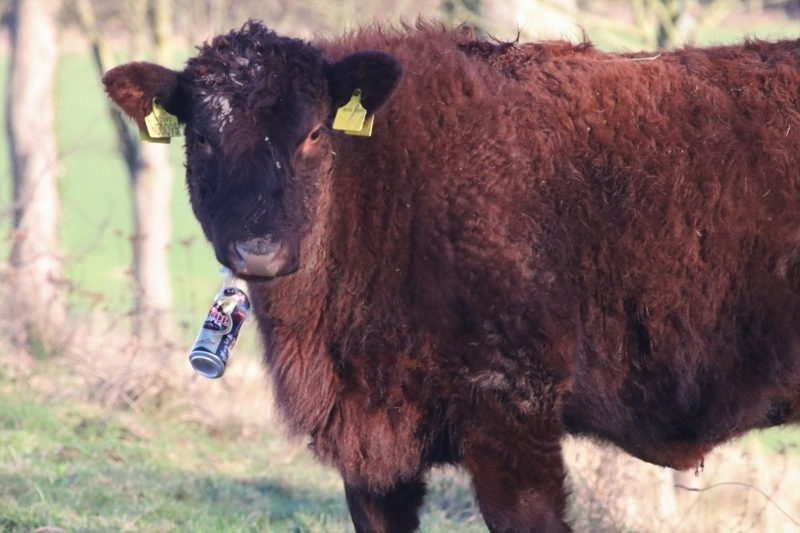Call For Zero Tolerance To Fly-tipping

A shocking image of a heifer chewing on a plastic beer can ring in Lincolnshire is the latest incident of fly-tipping that demonstrates the seriousness of the crime and the risk it can pose to cattle.
The incident took place near a picnic area at East Lighthouse, Sutton Bridge on land where cattle currently graze.
Landowner Stafford Proctor, who is a member of the CLA Lincolnshire Committee, says it is another example of people showing complete disregard for the countryside.
Risk To Animals
"On this occasion the fly-tipping was on a small scale and was a mixture of empty beer cans and bottles but the photograph clearly demonstrates the risk to our animals. The plastic around the beer cans could easily have been swallowed by our cattle which could have caused choking or even a fatality.
"Some of the beer cans had also been shredded before being dumped and there were glass bottles which could have also caused serious injury," said Mr Proctor.
He added: "Sadly, fly-tipping is not an uncommon sight on our land. We often have washing machines, building waste, fridges and tyres dumped in ditches and on fields. It happens on a near fortnightly basis.
"Until we see a zero tolerance approach to fly-tipping the illegal dumping of waste will continue. Each time there is an incident on private land it is the responsibility of the landowner to pay for it to be cleared. We are effectively paying for a crime committed by someone else."
CLA Action Plan
The CLA, which represents more than 30,000 landowners, farmers and rural businesses, has set out an action plan for how government, farmers, landowners and rural communities can work together to tackle fly-tipping.
Making the seizure of vehicles a default penalty for fly-tipping is recommended as part of tougher punishments put forward as well as enforcing fines for home and business owners whose waste is found in fly-tipped locations. There is also a call for new ways to be developed to clear up fly-tipping and support victims so that private landowners are not liable. You can view the full plan here.
CLA East Regional Director Ben Underwood said: "Fly-tipping is a disgraceful crime that is costing farmers and landowners thousands of pounds to clear. This latest incident is evidence that there is not only a financial cost of clearing the dumped waste but also a risk in some cases to cattle and other animals.
"The reality is that the number of incidents of fly-tipping continues to increase across the country yet the number of prosecutions is ludicrously low. Until this changes and there is a tough enforcement of punishments, which the CLA believes should include the seizure of vehicles as a default penalty, people will continue to commit this crime."
Results from a survey conducted by Farmers Weekly and CLA Insurance revealed that almost two thirds of farmers and landowners have been affected by fly-tipping and over half agree it is a significant issue in their area. Most victims surveyed said they had been targeted on multiple occasions.
Nationally over 1-million incidents of fly-tipping took place in 2016-17 costing local authorities across the country more than £57-millon to clear up. These figures do not include incidents of fly-tipping on private land where the cost of clearing the waste falls on the landowner.
Incidents of fly-tipping can be reported to local authorities, the Environment Agency or the police for investigation.
